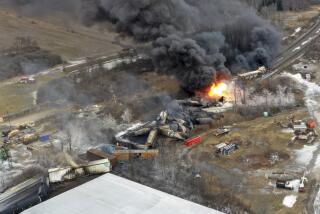Wrong Defense, Wrong Time
- Share via
Eight months ago, President Clinton told an audience at the National Defense University that the technologies for building a shield against potential missile attacks on the United States aren’t yet advanced enough to commit to such a costly project. On Tuesday, from the same platform, President George W. Bush signaled his intention to amend or abrogate the 1972 Antiballistic Missile Treaty and push ahead with a missile defense system. That determination does not reflect any breakthroughs in the ability to detect and intercept attacking warheads. It is instead a political decision to embark on a course from which, proponents of a missile shield intend, there can be no turning back.
Bush is right that the post-Cold War era has seen the emergence of a “new strategic environment” posing new threats from new adversaries. But the major threat in that environment doesn’t come from intercontinental ballistic missiles directed against the United States. It comes from terrorism that is most likely to be revealed when a chemical, biological or even nuclear weapon is smuggled into an American port or across a border and set off. An antimissile system is no answer to that threat.
Bush offered no details about what his missile defense program would look like, when it would be deployed or what it would cost. Ultimately, some sources indicate, the Bush administration envisages a global defense system based on land, sea and space-based weapons. The Clinton administration’s far less ambitious idea was for a smaller system costing about $60 billion and intended mainly to protect against a limited attack from rogue states like North Korea or Iran. Part of any new system’s cost could be offset, as Bush indicated, by slashing the U.S. nuclear stockpile of about 7,200 warheads, perhaps to the 3,500 called for in the still-unratified START II treaty.
Defense Secretary Donald Rumsfeld offered a rationale for hurried deployment of an embryonic missile shield, which he conceded would be far from foolproof. If nothing else, he suggested, it would serve to deter aggression. But a far surer deterrent already exists in the virtual certainty that any country that launched a missile against the United States would suffer immediate and massive destruction. The rulers of North Korea, Iran and Iraq, who know that a missile launch can’t be hidden, understand that as well as the rulers of the Soviet Union and China did in years past.
A missile defense is not inherently a bad idea, but plainly it is a premature one, given the formidable technical barriers yet to be crossed. Bush promises close consultation with the allies on his plans. The president would do well to consult first with the significant number of scientists who doubt that an effective system can be deployed any time soon. Their doubts merit the president’s respectful attention before he sets the United States and the world on a new and potentially perilous course.
More to Read
Sign up for Essential California
The most important California stories and recommendations in your inbox every morning.
You may occasionally receive promotional content from the Los Angeles Times.













